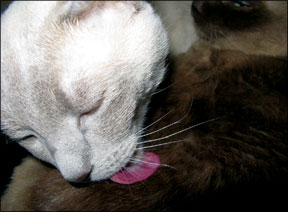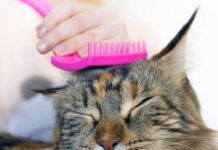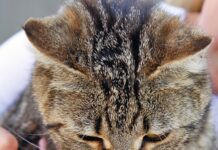When you have the time, sit down and watch your cat go through her grooming ritual. First the paws, then the sides of the face, behind the ears, the chest. Its a fascinating process because almost all cats do it the same way.
By the time you cat reaches adulthood, she will spend about 30 to 50 percent of her waking time grooming herself, explains Cynthia L. McManis, DVM, board-certified by the American Board of Veterinary Practitioners.

Bev Caldwell
288
Time will vary among species and individual cats. Longhaired cats will or should spend more time. Overweight cats may spend less time grooming themselves because its too difficult to reach some places. If your mischievous male gets himself into something messy, he will devote a significant amount of time to cleaning off a particular area.
But a cat actually does a lot more than clean herself when she licks her fur. Here are some intriguing grooming facts you may have never realized.
Protection & Temperature Control
Cats will meticulously clean themselves after eating. Researchers believe this is a instinctive protective behavior against predators. Your cat most likely eats cat food that you buy for him in the store. But your cats cousins in the wild – who eat small, live prey – must clean away any blood from their face or paws that could leave an odor or trail that might attract predators.
“Thats also why cats do a lot of cleaning up after giving birth, such as eating the placenta,” explains Dr. McManis, who has a private practice in Woodlands, Texas. “Anything that leaves behind a scent could be dangerous.” Within a few weeks after birth, the new kittens are already learning how to groom themselves by emulating their mother.
When a cat grooms itself, it helps to keep its temperature stable throughout the years. Take the hot weather, for example. Cats dont sweat very much at all, which is the way humans cool themselves down. There is some sweating from the paws, and cats cool themselves through the respiratory process – breathing in and out. “But about one-third of the cats cooling-off process is though grooming,” says Dr. McManis. When cats deposit saliva on their fur, the saliva evaporates and cools them off.
Then in cold weather when cats lick themselves, “they spread around natural oils from the skins sebaceous glands into their fur. These oils insulate the fur from cold and dampness,” says Dr. McManis.
Other Reasons for Grooming
Does it drive you crazy when your cat bites her nails? Shes not cleaning them and shes not doing it as a bad habit. Shes actually helping to tear off the worn-out sheath to reveal a nice, sharper nail underneath.
When cats lick a wound, they are doing more than superficially cleaning it. “We believe that the saliva contains enzymes which may serve as an antibiotic to prevent infection,” says Dr. McManis. “Licking also removes dangerous parasites from a wounded area and other parts of the body.” Although there are no studies showing that licking a wound helps with pain control, licking does help the cat calm down after a trauma.
Cats do often lick or groom or themselves to reduce stress, says Dr. McManis. Its probably similar to female humans who play with their hair when they get nervous. “Youll commonly see your cat lick itself when you admonish her to get off the counter, stop fighting with another cat or to stop scratching the furniture,” explains Dr. McManis. “The licking does seem to reduce anxiety.” Or sometimes your cat will lick himself when he loses his balance and falls off something.
“Sometimes, if under stress, a cat will groom to the point that it becomes compulsive and the hair will actually fall out,” says Dr. McManis. Then you may need to consult your veterinarian or an animal behaviorist.
An Expression of Friendship
One of the best reasons for grooming is to express friendship with another cat. In this case – called allogrooming – cats will lick each other. Kittens learn this early on after theyve learned to groom themselves. Later on, cats will commonly groom other cats they have grown up with or with whom they were adopted.
Typically, cats will lick the head, face and neck of other cats – places that are hard to reach on themselves. “I think its cool that cats instinctively know this is the area they need to groom on their buddy,” says Dr. McManis.
Cats also lick their human companions – usually on the arms or legs. We used to think cats licked us because they liked the salt on our skin. But now we know its because they like us. So consider it a great compliment and sign of affection when your cat licks you. Explains Dr. McManis, “It means that youre accepted into their home range.”



